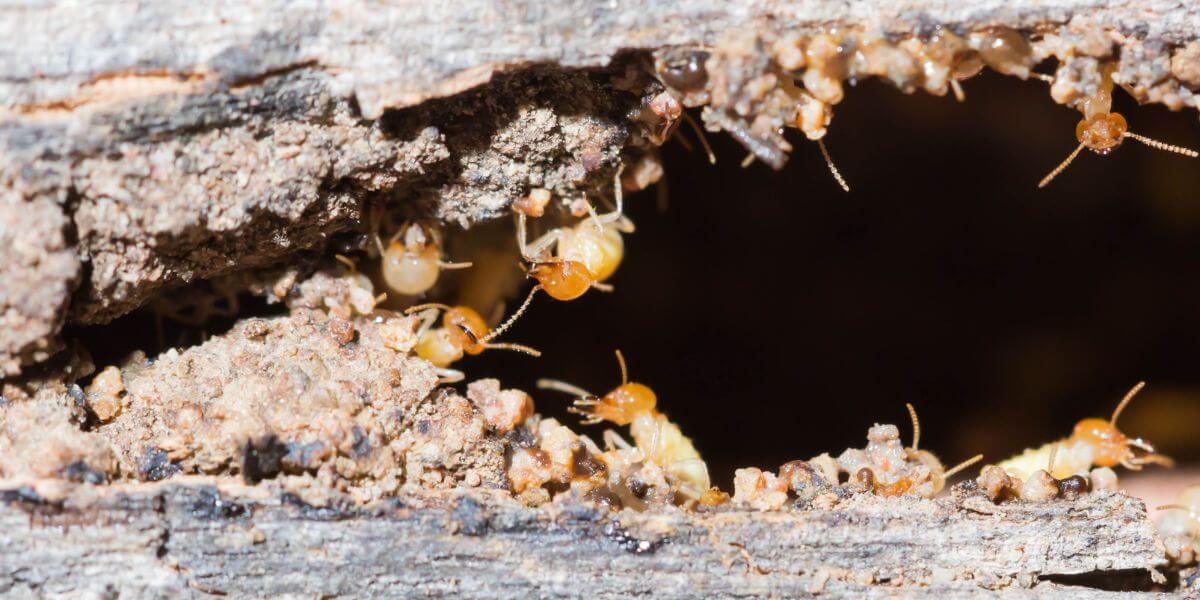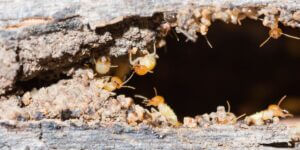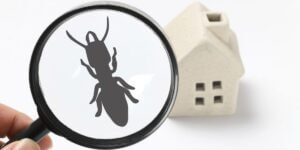Winter Termite Infestations: How to Protect Your Home in Coffs Harbour
When protecting your home in Coffs Harbour from termite infestations, it’s important to understand the specific challenges that winter brings.
In this blog, we will explore whether termites are worse during the winter season, discuss the importance of treating termites in winter, identify common signs of termite infestations, provide tips on how to get rid of termites in winter, examine natural or DIY remedies for termite elimination, and highlight the long-term consequences of not addressing termite infestations during winter.

Are Termites Worse In The Winter?
While termites are generally more active in warmer months, assuming that they become dormant or disappear entirely during winter would be a mistake. Here’s a closer look at why termites can still pose a threat during the colder season.
Termites seek warmth
During winter, termites seek warmth and shelter like any other living creature. They are attracted to the cozy interior of homes and buildings, where they can find refuge from the cold weather. Termites can exploit even the tiniest cracks, gaps, or foundation vulnerabilities to enter your property.
Winter humidity and moisture
Although winter is associated with drier conditions, it doesn’t mean that termites cannot find the necessary moisture to survive. They are resourceful creatures and can still access moisture from various sources within your home. Leaky pipes, condensation, and damp areas provide the moisture termites need to continue their destructive activities, even in colder temperatures.
Reduced competition
One factor contributing to termites being perceived as worse in winter is reduced competition for resources. With fewer competing pests and insects, termites have a better chance of establishing colonies and expanding their populations during this season.
Silent destruction
One reason termites can be particularly problematic during winter is that their activities often go unnoticed. Homeowners tend to spend more time indoors during this season, so potential signs of a termite infestation may be overlooked or dismissed as normal wear and tear. This delay in detection allows termites to cause significant damage to your home before you even realize they are present.
Should You Treat Termites In The Winter?
Treating termites during the winter season is a proactive step that can help protect your home from potential infestations. While termites may be slightly less active during this time, it is important to consider the following factors:
Preemptive measures
Treating termites in winter allows you to establish a protective barrier, creating a deterrent for termites trying to invade your property. By taking preventive action, you can minimize the risk of termite damage and avoid costly repairs in the future.
Capitalizing on reduced demand
During winter, termite activity tends to decrease, resulting in a potential decrease in demand for termite control services. This can work to your advantage, as pest control companies like Detecta Pest in Coffs Harbour may have more availability and even offer lower service prices. Taking advantage of this period can make termite treatment more affordable and convenient for homeowners.
Avoiding unnoticed infestations
While termites may be less active during winter, they can still cause damage to your home. One concern with winter termite infestations is that their activities often go unnoticed. Homeowners may spend more time indoors during the colder months, which means that signs of termite presence can be overlooked or mistaken for other issues. By treating termites in winter, you can address any existing infestations and prevent potential damage that may have otherwise gone unnoticed until it is too late.
Protecting vulnerable areas
Winter brings its own challenges for homeowners, such as moisture buildup and potential structural vulnerabilities. Treating termites during this time can help fortify your home’s defences against termite invasions. By implementing preventive measures, you can minimize the risk of termites exploiting cracks, gaps, or other vulnerabilities that may arise due to winter conditions.
Signs Of Termites In The House
Termites are known for their discrete nature, making it crucial to be vigilant in identifying the following signs of termite infestations:
Swarmers or winged termites
During winter, winged termites, known as swarmers, may be seen around your home. These reproductive termites are attracted to light and may emerge in large numbers, especially after rain. If you notice swarmers or discarded wings near windowsills, doors, or light fixtures, it strongly indicates a nearby termite colony.
Mud tubes
Termites construct mud tubes as protective tunnels between their colony and food source. These tubes are typically made of soil, saliva, and wood particles and can be found along exterior walls, foundations, or other areas where termites can access your home. Check for the presence of mud tubes as they indicate active termite activity.
Wood damage
Termites feed on wood, and their presence can cause structural damage to your home. Look for signs of wood damage, such as hollow-sounding timber, sagging or buckling floors, or peeling paint that resembles water damage. Termites often eat wood from the inside out, making it important to regularly inspect wooden structures, furniture, and fixtures.
Frass or termite droppings
Termites produce tiny pellets known as frass, which they push out of their tunnels. These droppings resemble sawdust or wood-coloured grains and are often found near termite-infested areas. Keep an eye out for small piles of frass, as they indicate an active termite presence.
Clicking or rustling sounds
Sometimes, you may hear clicking or rustling sounds coming from within the walls or wooden structures. Soldier termites communicate by banging their heads against the tunnel walls, producing audible sounds. If you hear these sounds, it is a clear indication of termite activity and should prompt immediate investigation.
Tight-fitting doors and windows
As termites tunnel through wooden structures, they can cause warping or distortion. This can make doors and windows difficult to open or close smoothly. If you notice sudden changes in the functionality of your doors and windows, it’s worth investigating for termite infestation.
Discarded termite wings
After swarmers find a suitable location to establish a new colony, they shed their wings. If you come across discarded wings near windows, light sources, or other entry points, it suggests that termites have recently invaded your home.
Strange odours
In some cases, termite infestations can produce a distinct odour. It is often described as a musty or mouldy smell. If you detect an unusual scent in specific areas of your home, especially near wooden structures, it is advisable to investigate further as it may be a sign of termite presence.
Damaged or weakened paper products
Termites are not solely limited to feeding on wood. They can also target paper products, including books, cardboard boxes, or documents. If you notice paper items with irregular holes, chewed edges, or weakened sections, it could be a sign of termites nearby.

How To Get Rid Of Termites In Winter
Getting rid of termites during winter requires a combination of preventive measures and targeted treatments. Follow these steps to effectively eliminate termites from your home:
Conduct a thorough inspection
Begin by doing an extensive inspection of your property to determine the degree of the termite infestation. Look for termite activity signals like mud tubes, damaged wood, frass, or swarmers. Pay special attention to moisture-prone areas and wooden structures, such as foundations, walls, attics, and crawl spaces.
Remove food sources
Termites feed on wood and cellulose-based materials. Eliminate potential food sources by removing wooden debris, dead trees, or excessive mulch from your property. Ensure that firewood, lumber, and other wooden materials are stored away from your home’s foundation.
Reduce moisture
Termites thrive in moist environments. Minimize moisture levels by repairing plumbing leaks, ensuring proper drainage around your home, and addressing water accumulation issues. Use dehumidifiers in basements and crawl spaces to reduce humidity levels.
Create a physical barrier
Install termite barriers or physical barriers around your home’s foundation. These barriers can be made of materials that termites cannot penetrate, such as stainless steel mesh or crushed rock. They act as a deterrent and prevent termites from accessing your property.
Apply termite treatments
Professional termite treatments are crucial for effectively eliminating termite infestations. Consult with a licensed pest control company like Detecta Pest to determine the most suitable treatment options. These may include liquid termiticides, baiting systems, or foams that target termites directly.
Regular monitoring and maintenance
After implementing termite treatments, it is important to regularly monitor your property for any signs of termite activity. Schedule follow-up inspections with your pest control provider to ensure the infestation has been successfully eradicated. Also, maintain a termite prevention plan by addressing structural vulnerabilities and conducting routine maintenance checks.
Baiting systems
Baiting systems are another popular method for termite control during winter. These systems involve placing termite baits near termite activity areas. The termites consume the bait, which contains a slow-acting insecticide. The poisoned termites then carry the bait back to the colony, spreading the insecticide and eliminating the entire colony. Baiting systems are effective and can be used as a long-term termite management strategy.
Are there any natural or DIY remedies that can help eliminate termites during winter?
While professional termite treatment is often the most reliable solution, a few natural and DIY remedies may help eliminate termites during winter. It’s important to note that these remedies are not as effective as professional treatments, and their success may vary. Here are some options to consider:
Orange oil
Orange oil contains d-limonene, which is known to be toxic to termites. Applying orange oil directly to termite-infested areas may kill or repel them. However, its effectiveness is limited to surface-level infestations and may not reach the core of termite colonies. It’s essential to consult professionals for a thorough assessment and to ensure proper treatment.
Vinegar
Vinegar is another commonly suggested natural remedy for termites. Spraying termite-infested areas with equal parts vinegar and water solution may help kill or repel termites. However, like orange oil, vinegar’s effectiveness may be limited and not eliminate the entire termite colony.
Nematodes
Nematodes are microscopic roundworms that are natural predators of termites. These beneficial organisms can be introduced into the soil surrounding your home to target termites. However, using nematodes effectively requires careful application and proper timing, which professionals best handle.
Cardboard traps
Cardboard traps are often recommended to lure and trap termites as a DIY method. The idea is to place damp cardboard near termite activity areas. Termites are attracted to the cellulose in cardboard and will gather there. Once the cardboard is infested, it can be removed and destroyed. However, this method only captures a fraction of the termite population and may not provide comprehensive control.
What are the long-term consequences of not addressing termite infestations in winter?
Neglecting to address termite infestations during winter can lead to severe and costly consequences for your home. Here are the potential long-term impacts of untreated termite infestations:
Structural damage
Termites are voracious feeders that consume wood and cellulose-based materials. Over time, untreated infestations can cause extensive structural damage to your home’s foundation, walls, flooring, and furniture. This damage weakens the integrity of the structure and compromises its safety.
Compromised property value
Untreated termite infestations can significantly decrease the value of your property. When potential buyers discover termite damage or ongoing infestations, they may hesitate to purchase the property or negotiate a lower price. Addressing termite infestations promptly helps protect the value of your home.
Increased repair costs
The longer termite infestations are left untreated, the more damage they can cause. Repairing the structural damage inflicted by termites can be expensive and time-consuming. In some cases, extensive damage may require major renovations or even rebuilding affected areas.
Health risk
While termites do not pose direct health risks to humans, the presence of termites can contribute to poor indoor air quality. When termites chew through materials, they release airborne particles that can trigger allergies and respiratory issues, especially in individuals with pre-existing conditions.
Secondary pest infestations
Termites create openings in your home’s structure, making it susceptible to other pests like ants, cockroaches, and rodents. These secondary infestations can further damage your property and create additional health and hygiene concerns.
Increased risk of future infestations
Untreated termite infestations create an attractive environment for new termite colonies to establish themselves in your home. The presence of pheromones and leftover materials from previous infestations can attract new termites, leading to a recurring problem if not addressed promptly.
In Conclusion
Protecting your home from winter termite infestations in Coffs Harbour is crucial to maintain its structural integrity. You can effectively safeguard your property by being aware of the signs of termite activity, implementing preventive measures, and seeking professional assistance when necessary. Regular inspections, addressing moisture and wood-to-soil contact issues, and considering professional termite control services are key to comprehensive protection.
While natural and DIY remedies may offer temporary relief in eliminating termites during winter, it is important to recognize their limitations. Professional termite treatment, such as the services provided by Detecta Pest, remains the most effective and reliable solution. Natural remedies like orange oil, vinegar, nematodes, and cardboard traps may provide temporary relief but not completely eradicate the entire termite colony. To ensure thorough termite elimination and long-term protection for your home in Coffs Harbour, it is recommended to consult professionals who can assess the extent of the infestation and provide appropriate treatment options.
Ignoring termite infestations during winter can lead to severe long-term consequences for your home in Coffs Harbour. Untreated infestations can result in structural damage, decreased property value, increased repair costs, health risks, secondary pest infestations, and a higher risk of future termite problems. To protect your home, it is crucial to address termite infestations promptly and seek professional assistance from Detecta Pest, a trusted pest control company in Coffs Harbour. Their experienced team can conduct thorough termite inspections, offer tailored treatment plans, and provide ongoing pest management solutions. Don’t underestimate the potential impact of termite infestations—take action today to safeguard your home.
For effective and reliable termite treatment in Coffs Harbour, contact Detecta Pest today. Their experienced professionals can conduct comprehensive termite inspections, recommend tailored treatment plans, and provide ongoing pest management solutions. Trust Detecta Pest to protect your home from termites during winter and beyond. To book an appointment, call +61 475 227 942 or visit their Google Business Profile for more information.
At Detecta Pest, they understand the importance of providing competitive prices without compromising on service quality. Their termite treatment services in Coffs Harbour are designed to be affordable while delivering effective results. Choose Detecta Pest for expert service and comprehensive termite control solutions. Safeguard your home from termites with their competitive prices and expert service.




